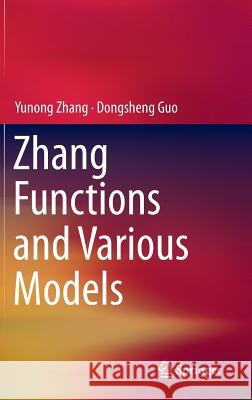Zhang Functions and Various Models » książka



Zhang Functions and Various Models
ISBN-13: 9783662473337 / Angielski / Twarda / 2015 / 236 str.
Zhang Functions and Various Models
ISBN-13: 9783662473337 / Angielski / Twarda / 2015 / 236 str.
(netto: 191,66 VAT: 5%)
Najniższa cena z 30 dni: 192,74
ok. 16-18 dni roboczych.
Darmowa dostawa!
Zhang Functions and Various Models
"This detailed, yet concise book of 236 pages contains 5 parts and 18 chapters on Zhang functions (ZF) and Zhang neural dynamics (ZD). ... This book on neural computing may serve as a revelation to numerical analysts as it alters the whole field of computing." (Frank Uhlig, zbMATH 1339.65002, 2016)
Time-Varying Reciprocal.- Time-Varying Inverse Square Root.- Time-Varying Square Root.- System of Time-Varying Linear Equations.- Over-Determined and Under-Determined Systems of Time-Varying Linear Equations.- Time-Varying Linear Matrix-Vector Inequality.- Time-VaryingMatrix Inverse.- Time-VaryingMatrix Left Pseudoinverse.- Time-VaryingMatrix Right Pseudoinverse.- Time-VaryingMatrix Square Root.- Time-Varying Complex Reciprocal.- Time-Varying Complex Matrix Inverse.- Time-Varying Complex Matrix Generalized Inverse.- Application to Fixed-Base Robot RMP.- Application to Mobile Robot RMP.
Yunong Zhang received the B.S. degree from Huazhong University of Science and Technology, Wuhan, China, in 1996, the M.S. degree from South China University of Technology, Guangzhou, China, in 1999, and the Ph.D. degree from Chinese University of Hong Kong, Shatin, Hong Kong, China, in 2003. He is currently a professor at School of Information Science and Technology, Sun Yat-sen University, Guangzhou, China. Before joining Sun Yat-sen University in 2006, Yunong had been with National University of Singapore, University of Strathclyde, and National University of Ireland at Maynooth, since 2003. In addition, he is also currently with the SYSU-CMU Shunde International Joint Research Institute, Foshan, China, for cooperative research. His main research interests include neural networks, robotics, computation and optimization. He has been working on the research and application of neural networks/dynamics for 16 years. He has published totally more than 375 scientific works of various types. These include 15 monographs/books/chapters, 5 authorized patents, more than 200 first-authored works, 27 IEEE-Transactions/magazine papers, 10 solely-authored works, and 105 SCI-indexed papers (with 74 SCI-indexed papers published in recent 5 years and with the number of SCI citations being 1213). Yunong Zhang was supported by the Program for New Century Excellent Talents in University in 2007, was presented the Best Paper Award of ISSCAA in 2008 and the Best Paper Award of ICAL in 2011.
Dongsheng Guo received the B.S. degree in automation in 2010 from Sun Yat-sen University, Guangzhou, China, where he is currently working toward the Ph.D. degree in communication and information systems in the School of Information Science and Technology. In addition, he is also with the SYSU-CMU Shunde International Joint Research Institute, Foshan, China, for cooperative research. He has been continuing his research work under the supervision of Prof. Y. Zhang since 2008. His current research interests include neural networks, nonlinear systems, and robotics. He has published more than 80 scientific papers as author or co-author (including 6 IEEE-transaction papers), and has 2 patents of invention. Besides, he was the recipient of the 2012 Google Excellence Scholarship, Shanghai, China, in 2012, as well as the Academic Award for Excellent Doctoral Student granted by the Ministry of Education of China, Guangzhou, in 2013.
This book focuses on solving different types of time-varying problems. It presents various Zhang dynamics (ZD) models by defining various Zhang functions (ZFs) in real and complex domains. It then provides theoretical analyses of such ZD models and illustrates their results. It also uses simulations to substantiate their efficacy and show the feasibility of the presented ZD approach (i.e., different ZFs leading to different ZD models), which is further applied to the repetitive motion planning (RMP) of redundant robots, showing its application potential.
1997-2026 DolnySlask.com Agencja Internetowa
KrainaKsiazek.PL - Księgarnia Internetowa









